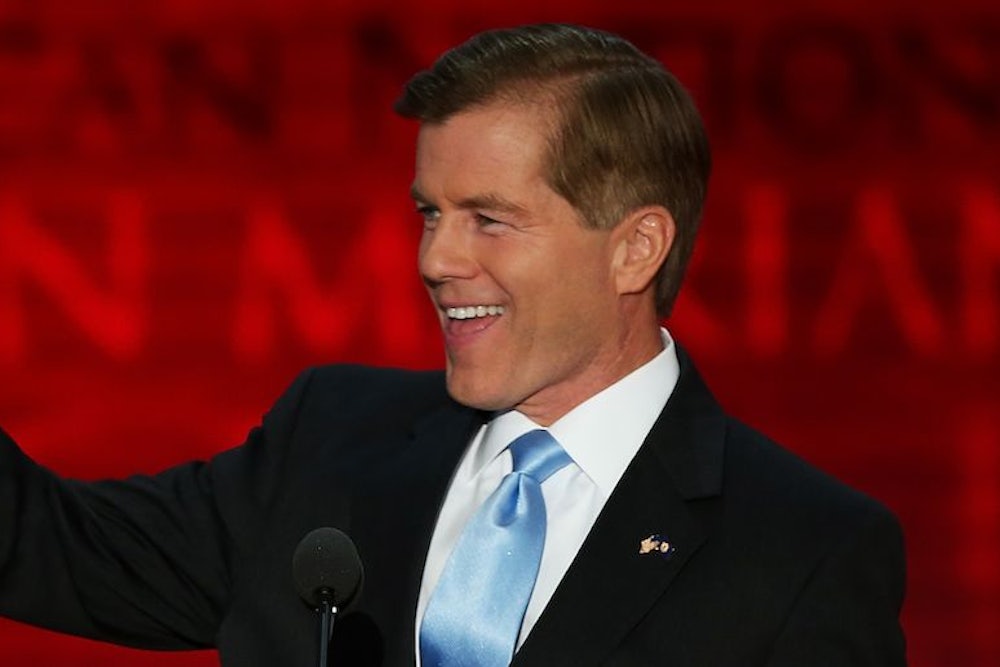Four years ago, when he was elected governor of Virginia, Bob McDonnell was a golden boy of the Republican Party, and to liberals he was a villain who hated gays and unwed mothers and thwarted equal-pay measures. A year later, he was his party's choice to rebut Obama's 2010 State of the Union address. And in 2012 he became a card-carrying member of the GOP's unofficial anti-woman caucus by supporting a bill to mandate "transvaginal ultrasounds" before abortions, backing off only after he and the state were ridiculed nationally.
Now, suddenly, McDonnell is a centrist, having made "frenemies" with Maryland Governor Martin O'Malley, a Democrat, over a mammoth transportation deal that was settled late last week. The deal provoked outrage from the Wall Street Journal editorial page ("There's one thing uglier than a Democratic tax-and-spend spree. A Republican one.") and from Ken Cuccinelli, Virginia's Republican attorney general and the party's presumptive nominee for governor this year, who opposed the plan and tried to derail it by questioning its legality. This one moderate bullet point on McDonnell's still-conservative CV has also made him an apostate in certain media circles. "[W]hen the time comes that being a conservative demands that you stand up for what's right and reject the easy way out, Bob McDonnell is not going to stand on principle," Erick Erikson wrote Monday, in a screed calling the governor "a liar" and an "unprincipled fake conservative." Seethed the Journal, "At least Republicans can erase Mr. McDonnell's name as a national candidate or VP choice in 2016."
If McDonnell—who cut billions from the budget, tried to exempt his state from Obamacare, and expanded concealed-carry gun laws—has been cut from the ranks of bona fide conservatives, then who can possibly please the right? And would such a politician stand a chance in a state like Virginia? After all, despite its "vaginal probe" notoriety, Virginia is hardly a right-wing stronghold. When polled, voters rejected the heady fights over social issues that dominated the statehouse in the early part of 2012. As I learned on the campaign trail, they consider their state a sort of noble, bipartisan Arcadia. Last fall, the state was home to the nation's most restrained, courtliest Senate race: Former DNC chair Tim Kaine, who was venomous in that role, became an irrepressible gentleman; and onetime firebrand George Allen, best known for his "Macaca" moment in 2006, ran a dry campaign on a pro-business platform.
The blandly charming McDonnell has been as smooth a conservative as possible in this cordial atmosphere. He has spent four years pushing quiet, incremental measures to diminish gun control. The abortion bill he signed may not have required vaginal probes, but it did make ultrasounds mandatory. And though he approved a tax increase to pay for the transportation bill, it's a highly regressive one. Cuccinelli's style of governance, meanwhile, is not even remotely charming. As attorney general, he has issued an opinion permitting discrimination against gays at the state's universities, led a witch hunt against a scientist researching climate change, sued the federal government over Obamacare, and even attempted to cover up the left breast of Virtus, the Roman goddess, on Virginia's state seal.
Having come to know Cuccinelli well in recent years, Virginians are not inclined to view him favorably. That's why the campaign leading up to the November faceoff between him and Democrat Terry McAuliffe is shaping up to be a test of how skewed the metrics for "true" conservatism can become before the GOP marginalizes itself in Virginia and other moderate states. Some Virginia Republicans would rather not wait to find out. In a closed-door meeting last Friday, two prominent business leaders reamed out Cuccinelli for failing to tone it down for the governor's race. On Saturday, Rep. Scott Rigell—who was once a signatory of the Tea Party oath but recently joined liberals in supporting a federal bill to regulate guns—stood beside President Barack Obama at an event in Newport News, where Obama name-checked Rigell and then ripped the impending sequester.
And then there's Bill Bolling, the state's lieutenant governor. A longtime moderate, Bolling spent the last two or three years trying to win over conservatives by supporting the GOP-controlled Virginia Assembly's most reactionary bills. Late last year, he called for McDonnell to reject Medicaid funds, even though Bolling's most meaningful accomplishment as a young politician was to expand a federally funded, Medicaid-like program in Virginia. His right-wing act was unconvincing. In late November, after Cuccinelli supporters on the state GOP's governing board changed the nomination process from an open primary to a closed convention, Bolling dropped out of the Republican race. He may run yet—as an independent. The last week has seen him praising bipartisanship before students of Larry Sabato, the University of Virginia political forecaster, and reestablishing himself as a moderate in an interview with the Washington Post's Robert McCartney.
Who knows what would happen to the race—in which Cuccinelli and McAuliffe poll about even—should Bolling enter the fray.1 But the interparty arguments of just the past week have shown that Cuccinelli's support among the GOP is shaky even without Bolling offering an alternative, relatively moderate candidacy. This is bad news for the party conservatives who are betting that Cuccinelli can win the general election in spite of his ultra-conservatism. If Bolling does join the race, and attracts the enlightened Republicans who can't stomach Cuccinelli, he could doom the attorney general's bid—and the GOP's hopes of retaining the governorship. It's a story we've heard before. And if the Republican Party is incapable of stopping the likes of Cuccinelli in moderate swing states like Virginia, it's a story we should expect to hear many times over in the coming years.
Not poll-watchers, anyway: My colleague Nate Cohn says it's not clear how Bolling would change the dynamics.
